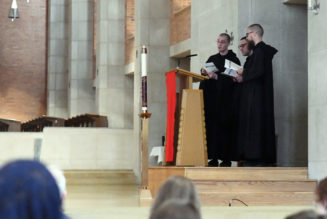 When it comes to our struggle in personal prayer there are some things that we need to unlearn. For too many, private prayer is often a formal, even stuffy affair, that drips of boredom and unnecessary formality and has lots of rules. Perhaps we learned some of our lessons too well.
When it comes to our struggle in personal prayer there are some things that we need to unlearn. For too many, private prayer is often a formal, even stuffy affair, that drips of boredom and unnecessary formality and has lots of rules. Perhaps we learned some of our lessons too well.
And yet many of the youngest children have not learned these lessons, and they seem to pray with great ease. They are unassuming and will say almost anything to God. It is true that children may have a lot learn about public and liturgical prayer, but when it comes to personal and private prayer they have much to teach us.
Perhaps a parable is in order:
A young girl received her First Holy Communion and, when she returned to her pew, she was noticed by her parents to be in rather deep prayer. After Mass they asked her, “What were you praying about after your First Communion?” “Well,” she said, “I prayed for mommy and daddy, and my (dumb) brother too! And then I sang Jesus a song, and told him a ghost story.”
So informal, so conversational, so unassuming, so real.And yet, it is the way many little children pray.
But over the years it seems we drift away from this honest simplicityand layer on lots of “shoulds and oughts.” Perhaps we over learn, or over apply, some of the lessons we learn about human interactions. I remember as a child that a neighbor woman took up a “goofy hair style.” And so I said to my mother in a voice that might be overheard, “Mom, why does that lady have Goofy hair?” “Shhhh….” she said, “Don’t say that, you might hurt her feelings.” She later admitted to me that the hair WAS goofy, but explained that there are many things we shouldn’t say. We should keep certain things to our self.
This sort of lesson is an important one to learn and has its place. But like any lesson it can be over applied. The fact is that many today remain silent when they should speak out by way of fraternal correction. There are times when we need to be honest and clear. So too in our personal prayer with God.
Early in my priesthood a woman came to me and spoke quite frankly and vividly about her anger and disappointment with God who had made her suffer loss. “Have you talked to God about this?” I asked. “Oh no! Father,” she said with her hands in the air, “I can’t talk to God like that.” And she smiled as these words left her mouth because she knew they were silly. I smiled too and said, “He already knows doesn’t he….So you know what your prayer needs to be about. Now talk to him just like you talked to me.”
The Book of Psalms is the prayerbook that God entrusted to Israel. In it is enshrined every human emotion,thought and experience. There is joy, exultation, praise and serenity. But there is also anger, fear, disappointment and even hatred. It’s all in God’s “official prayer book.” And thus God teaches that the whole range of experience, thought and emotion is the stuff of prayer. It is precisely these things that God wants to engage us on.
Little children seem to know this instinctively.They pray about what is going on, what interests them, and they do so plainly and without a lot of formality. Even the bad stuff is out there.
I have a brief but clear memory of my prayer life as a little child. I must have been about 5 or 6 and there was a Sacred Heart statue on the dresser. I would see that statue and start talking to God in the freest way, and God would speak to me, simply and in a way a child could understand. But it was very real. And then the memory shuts off. It is just a small window into my early childhood, one of the few, and it was filled with God.
Since my late 20s I have striven to find my way back to that simple and profound experience of the presence of God in prayer. So simple, yet so real. Somewhere along the line it faded. Perhaps I had over learned the lesson that there are just things you’re not supposed to say and the conversation became strained and unreal and ultimately assumed the “irrelevance” that many today claim of their prayers.
I have made a lot of progress in journey back by unlearning some of the rules I applied.Hearing little children pray has been a great help. It is the littlest ones really who seem to live in that enchanted world of the presence of God. By 5th grade it is fading fast and by 7th grade the flesh has fully manifested and a kind of spiritual dullness seems to overtake most middle school kids. But wow, can little kids pray. The Book of Psalms says exore infantium…from the mouth of infants and little children you have perfected praise O Lord unto the exasperation of your enemies. (Psalm 8:2).
Do a little unlearning where required in the prayer department.Though we need to teach kids about the liturgical and public prayer which has its necessary rules, they have much to show us in terms of private prayer; a prayer that is personal, unassuming, about real things and spoken with childlike simplicity and trust. Amen I say to you, unless you receive the kingdom of God like a little child you shall not enter it. (Mark 10:15)
A teacher collected these prayers from her young students and insists that all these prayers are real, actually written by children. Enjoy the unassuming and direct, yet respectful approach to God. The teach asked the children to begin all their prayers, “Dear God…”
[embedded content]








